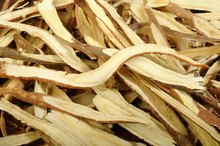What does fact checked mean?
At Healthfully, we strive to deliver objective content that is accurate and up-to-date. Our team periodically reviews articles in order to ensure content quality. The sources cited below consist of evidence from peer-reviewed journals, prominent medical organizations, academic associations, and government data.
- Journal of Diabetes Science and Technology: Cinnamon -- Potential Role in the Prevention of Insulin Resistance, Metabolic Syndrome and Type 2 Diabetes
- Journal of Diabetes Science and Technology: Cinnamon -- Potential Role in the Prevention of Insulin Resistance, Metabolic Syndrome and Type 2 Diabetes
- Journal of the International Society of Sports Nutrition: Effects of a Water-Soluble Cinnamon Extract on Body Composition and Features of the Metabolic Syndrome in Pre-Diabetic Men and Women
- Journal of the International Society of Sports Nutrition: Effects of a Water-Soluble Cinnamon Extract on Body Composition and Features of the Metabolic Syndrome in Pre-Diabetic Men and Women
- National Heart, Lung, and Blood Institute: What Is Metabolic Syndrome?
- National Heart, Lung, and Blood Institute: What Is Metabolic Syndrome?
- European Journal of Clinical Investigation: Effects of a Cinnamon Extract on Plasma Glucose, HbA and Serum Lipids in Diabetes Mellitus Type 2
- European Journal of Clinical Investigation: Effects of a Cinnamon Extract on Plasma Glucose, HbA and Serum Lipids in Diabetes Mellitus Type 2
The information contained on this site is for informational purposes only, and should not be used as a substitute for the advice of a professional health care provider. Please check with the appropriate physician regarding health questions and concerns. Although we strive to deliver accurate and up-to-date information, no guarantee to that effect is made.
What Is Cinnulin PF?
Cinnulin PF is a dietary supplement that contains an extract of the cinnamon variety known as Cinnamomum burmannii or Cinnamomum cassia 38. According to a review published in the "Journal of Diabetes Science and Technology" in 2010, whole cinnamon has compounds that may help prevent or treat Type 2 diabetes, heart disease, cancer, stroke and Alzheimer's disease 2. However, whole cinnamon contains potentially toxic substances. Cinnulin PF manufacturers claim their product lacks these toxins. Do not use Cinnulin PF until you've spoken to your doctor.
If you are experiencing serious medical symptoms, seek emergency treatment immediately.
Cinnulin PF Ingredients
A typical one-capsule serving of Cinnulin PF contains 150 milligrams of a water-soluble Cinnamomum burmannii extract that, according to the manufacturers, has been filtered to include only the type-A polymers associated with the benefits linked to whole cinnamon 38.
What the Research Says
What Herbs Interact With Paxil?
Learn More
In 2006, a study published in the "Journal of the International Society of Sports Nutrition" reported that men and women who have metabolic syndrome -- a term used to describe people who have a high risk of conditions like heart disease, diabetes and stroke -- are less likely to develop chronic medical problems if they are supplementing with Cinnulin PF 5. Another 2006 study from the "European Journal of Clinical Investigation" found that cinnamon extracts similar to Cinnulin PF could help lower the blood glucose levels of people with Type 2 diabetes 37.
Things to Consider
Cinnulin PF supplements have not been approved by the U.S. Food and Drug Administration, and their contents have not been verified for purity or effectiveness. Nursing or pregnant women and children should not take Cinnulin PF. While manufacturers report that there are no known significant side effects associated with taking Cinnulin PF, people who are using medications for low blood sugar should avoid any form of cinnamon extract since it may cause them to develop hypoglycemia 38. In addition, taking Cinnulin PF at the same time as other supplements containing fenugreek, bitter melon, chromium, garlic or Panax ginseng may also cause a dangerous drop in blood sugar.
- Cinnulin PF supplements have not been approved by the U.S. Food and Drug Administration, and their contents have not been verified for purity or effectiveness.
- While manufacturers report that there are no known significant side effects associated with taking Cinnulin PF, people who are using medications for low blood sugar should avoid any form of cinnamon extract since it may cause them to develop hypoglycemia 3.
Expert Recommendations
Side Effects of Deglycyrrhizinated Licorice
Learn More
Despite the initially positive study results, it's best not to attempt to use Cinnulin PF to treat or prevent any medical condition until additional clinical studies are conducted, advised scientists in a 2013 "Annals of Family Medicine" review 1. It remains unknown what specific dosage ranges are safe for different ages, genders and disorders, and there is no evidence showing that long-term supplementation is problem-free. Manufacturers urge customers to only use Cinnulin PF under a doctor's direction.
Related Articles
References
- Cinnulin PF: Additional Information
- Journal of Diabetes Science and Technology: Cinnamon -- Potential Role in the Prevention of Insulin Resistance, Metabolic Syndrome and Type 2 Diabetes
- Swanson: Cinnulin PF Cinnamon Extract
- Biosynergy: Other Supplement Ingredients
- Journal of the International Society of Sports Nutrition: Effects of a Water-Soluble Cinnamon Extract on Body Composition and Features of the Metabolic Syndrome in Pre-Diabetic Men and Women
- National Heart, Lung, and Blood Institute: What Is Metabolic Syndrome?
- European Journal of Clinical Investigation: Effects of a Cinnamon Extract on Plasma Glucose, HbA and Serum Lipids in Diabetes Mellitus Type 2
- WN Pharmaceuticals Ltd.: Cinnamon Extract -- Cinnulin PF
- Annals of Family Medicine: Cinnamon Use in Type 2 Diabetes - An Updated Systematic Review and Meta-Analysis
Writer Bio
Michelle Kerns writes for a variety of print and online publications and specializes in literature and science topics. She has served as a book columnist since 2008 and is a member of the National Book Critics Circle. Kerns studied English literature and neurology at UC Davis.









